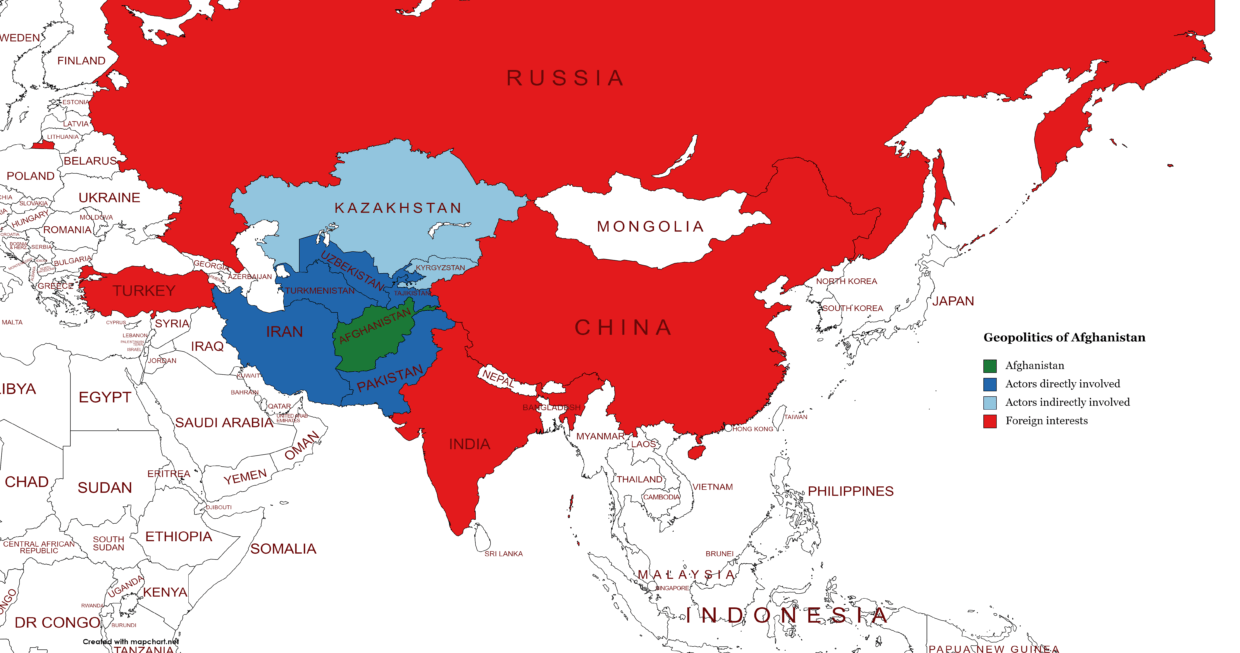Afghanistan briefing: regional and international foreign relations

Since U.S. President Joe Biden confirmed the NATO troop withdrawal from Afghanistan, several regional and international actors have demonstrated their commitment to support the Afghan transition peace process and exploit the possible geopolitical vacuum left by Washington.
In the last weeks, even though the White House confirmed its humanitarian support to Kabul, Turkmenistan, China, Russia, and Pakistan had promoted their economic and diplomatic strategy to confirm their presence in Afghanistan.
Regional and international actors have different strategies and goals in Afghanistan, although they have expressed their grave concern over the possible future destabilisation of the region.
For example, the United Nations recently released a report that underlines the link between the Taliban and al-Qaeda, the possible residence of al-Qaeda’s leader Ayman al-Zawahiri in the AfPak region, and Al Qaeda’s presence in at least 15 Afghan provinces, primarily in the east, southern and south-eastern regions, under the direction of Sheikh Mahmood.
Afghanistan-Turkmenistan economic cooperation and TAPI project
In Central Asia, Turkmenistan has risen as one of the most active players in Afghanistan, supporting trade cooperation and the Turkmenistan-Afghanistan-Pakistan-India natural gas project (TAPI) since Ashgabat needs to enhance its energy export to support the national economy (Gasdotto TAPI tra speranze future e interessi geopolitici). Considering that the Trans-Caspian Pipeline (TCP) appears to be far from its construction, although recently Baku and Ashgabat signed a Memorandum of Understanding on joint exploration and development of the Dostluk field in the Caspian Sea, the Turkmen Government is looking at Afghanistan and the eastern Asian market as the most profitable in a short period.
In this context, it is possible to interpret the two-day meeting between the Minister of Foreign Affairs of Afghanistan, Mohammad Hanif Atmar, and the Minister of Foreign Affairs of Turkmenistan, Rashid Meredov, where the parties discussed the TAPI project, the construction of railroads, the marble export from Herat to the Turkmen market, and the Afghan-Turkmen commercial cooperation inside the Lapis Lazuli Corridor.
Kabul sees these cooperation projects as an opportunity to strengthen its national economic development and support Central Asia’s stabilisation, while Ashgabat is trying to raise its role in the regional energy market and the peace process.
U.S. humanitarian support to Afghanistan
The U.S. State Secretary, Antony Blinken, stated that the White House would provide 226 million dollars of humanitarian aid as a sign of US support to the Afghan people. This financial aid, as Blinken stated, will support at least 18 million needy Afghans, including 4,8 million displaced persons.
Since 2001 the United States has provided around 4,9 billion dollars to Afghanistan. Blinked highlighted that Washington is still committed to supporting the Afghan socio-economic development process. In addition, he called on the Taliban to speed up the national peace process to end forty years of conflict and create the conditions to allow the refugees to return home.
Pakistan’s strategy in Afghanistan
Pakistani Prime Minister Imran Khan stated that Islamabad is trying to achieve a political settlement in Afghanistan before the NATO troops withdraw from the country. However, according to Imran Khan, if after the international coalition forces’ withdrawal, the Afghan situation worsens and result in a civil war, Pakistan will be one of the first countries affected by refugee migration and security problems. Actually, inside Pakistan, there is a massive concern over Afghanistan’s future after the US military withdrawal.
Imran Khan believes that the U.S. Special Representative for Afghanistan Reconciliation, Zalmay Khalilzad, will play a consistent role in establishing the political framework in Afghanistan to avoid future political crises and civil conflicts.
It should be noted that last week Kabul-Islamabad relations registered new tensions after the Afghan National Security Adviser, Hamdullah Mohib, accused Pakistan and the Pakistani Inter-Service Intelligence (ISI) of aggressive behaviour and of supporting the Taliban. Consequently, Islamabad severed ties with Mohib.
Chinese investments in the Afghan energy sector
On May 31st, 2021, the President of Afghanistan, Mohammad Ashraf Ghani, discussed investment opportunities with Chinese investors. As a result, the Chinese group manifested the will to invest 400 million dollars in a coal power plant to generate 300 Megawatts of electricity.
Ghani invited the Chinese investors to consider the energy potentialities of Afghanistan since the Afghan President instructed the Afghan promotion group to study the project plan of the company De Afghanistan Brehsna Shirkat. According to the company, about 35% of Afghans currently have access to electricity. Therefore, Chinese investments might enhance Afghan energy production and improve national living conditions.
Afghanistan produces about 600 Megawatts of electricity, while more than 670 Megawatts are imported from Iran, Tajikistan, and Uzbekistan.
Russian foreign policy in Afghanistan
The Russian Federation aims to play a major role in Afghanistan and Central Asia to counter the United States and control the rising role of Beijing, which has copiously invested in the region to promote the Belt and Road Initiative.
At the end of May, the Minister of Foreign Affairs of the Russian Federation, Sergey Lavrov, stated that Moscow is interested in stabilising the situation in Afghanistan and continuing to assist the national reconciliation process. Furthermore, the Kremlin has repeatedly expressed its desire to activate its working format on Afghanistan, including all the regional actors and the United States.
Previously, Lavrov discussed with the Minister of Foreign Affairs of Tajikistan, Sirojiddin Muhriddin, the necessity to strengthen the Tajik-Afghanistan borders in the framework of the Collective Security Treaty Organisation (CSTO). During the Russian-Tajik meeting, the two parties discussed the Russian help in the Tajik plan to establish more checkpoints to control the borders since the Kremlin’s concerns about the presence of fighters in northern Afghanistan and consequently contrast the rise of terrorist groups.
The Tajik-Russian security cooperation is part of a broad Russian strategy in Central Asia. Russian President Vladimir Putin stressed Afghanistan’s significant role in Central and South Asia security in May.
Author: Giuliano Bifolchi & Silvia Boltuc
